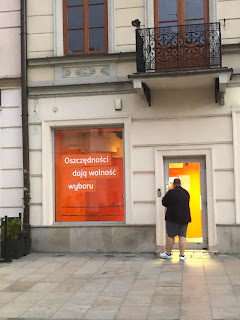 |
| Not to be found at Scots ordinations. |
Having done three Saturday shifts, I saved up my accredited time to go to a priestly ordination elsewhere in Scotland this week.
Sorry to be so vague on the location, but the times, the times. One of my former professors once listened in astonishment mingled with amusement as a pair of aggrieved theologians of the progressivist party denounced something I wrote. When asked if he know me, my prof blurted, "Do I know her? She was my student!" He thought it was funny, but I suspect there were unintended consequences.
Public life was less complicated when I stuck to writing heartwarming and non-partisan blogposts about Single Life.
Anyway, Benedict Ambrose and I met at the railway station one afternoon this week, and we took a train to this mysterious location before walking to the cathedral. B.A. predicted only a small crowd, but he was wrong. The cathedral was heaving with people old and young, including babies. There were whole rows of Protestant relatives, which was edifying for my Protestant granny darkened the door of Catholic Churches only for weddings. There was a choir which gave us classic belter hymns and the Missa de Angelis as well as Peter Aston and other modern stuff. There were a few mantillas and a smattering of hats, so I pulled my scarf over my head. (My personal head covering rule is "Never be the only woman who does; always support the women who do.") With the processional hymn, there appeared dozens of priests--most of them a decade or more younger than us--and a cheerful-looking bishop.
Mass is often moving, but this was moving in a particular way, as it was involved a young man we met years ago when he was a student, and invited to dinner, and prayed for when he was in hospital, and visited in Rome. It was also moving because we knew some of his pals--also students when we met them, either in Scotland or in Rome, who had been ordained before him. One of these pals vested him with stole and chasuble, and I felt all very sentimental. In short, although all these chaps were diocesan chaps, some of them were also/had been Our Chaps, which I mention as part of my ongoing battle against unpleasant Trad stereotypes.
Newsflash: Most people in Scotland who go to the traditional Latin Masses under the aegis of the local bishop also go to the Ordinary Form when necessary. Many of us take part in the broader life of our dioceses. Those of us who get ordained are just as likely to become ordinary diocesan priests as we are to join the FSSP or "the Institute." Some of us are actually Protestants married to Catholics or discerning our way to conversion. Some of us are French ladies who refuse to wear mantillas and even wear trousers to Mass. But we're all restorationists, and we all love lace. (LACE! LACE!)
The Mass was about 2.5 hours long, and I thought the Protestant relatives held up marvellously. There were a pew of them in front of us, so during the kneeling bits, through which they staunchly sat, I knelt with my butt on the pew, whereas B.A. just breathed down their necks.
Anyway, the Mass was marvellous, and there were two more teary moments: when the new priest blessed his kneeling bishop (weep, weep) and when he blessed his widowed mother (weep, weep again).
Afterwards there was a party in the hall with ladies dispensing coffee and wine, plates of sandwiches and cake, cupcakes, Eccles cakes, chocolate-topped Rice Krispie treats, and all the other things a Catholic could expect at a Scottish diocesan church party. For some reason, I kept looking for the baklava that wasn't there, and was never going to be there, for this is Scotland, not Toronto. Come to think of it, there were no sugared almonds, either. In the UK, cake is king.
There were definitely Coronation Chicken sandwiches, which I love. Cheese and pickle. Egg and cress. Tuna mayo. Ham. Other chicken. Naturally they were cut into triangles. There were cheese quiches. Scottish food is not really what you think it is. If I recall correctly, there wasn't any shortbread.
There were a dozen young priests (at least) in black soutanes, and another very moving moment occurred when a goodly number of them sang "Ad Multos Annos" to the new priest. B.A. and I took this for the school song of the Pontifical Scots College in Rome, and it hit with particular force for, as at the Scots College refectory, there were portraits of old Scots priests and bishops around the room. Since the 1560s, a Scots priest has been a minority among a minority, we all know what happened to St. John Ogilvy, and there will doubtlessly be unpleasantness in Glasgow next Sunday, or on the 12th at the latest, because Orange gonna Walk.
But I didn't have much time for such sober thoughts, for there were many priests and other people--laypeople and more Protestants, by the way--to greet and photos to take for absent friends. Eventually the room emptied out of families with children and the percentage of priests and their university pals was even higher, and B.A. and I decided to go to our hotel.
The next day we met a family member for brunch--bacon butties and black pudding were involved--and then went for a long walk my shoes weren't made for, and finally turned up at a diocesan church for the new priest's First Mass, which in Polish I'm told is a Msza prymicyjna, and in Novus Ordo is a "Mass of Thanksgiving."
Once again, there was a bigger crowd and much more Latin than we expected. There was a super homily from a Jesuit priest who told us that the new priest--not even baptised at the time--had at university become disenchanted with the "secular city," a place the homilist didn't seem that impressed with, either. There was a strong suggestion that we had excellent lunch parties with Catholic pals to thank for the new priest's baptism, let alone his ordination, which I think ought to be a lesson to us all.
There was another heartwarming moment when the new priest presented his mother with flowers. And there was a moment of comedy when I hastily readjusted my scarf just as I was receiving a Primi blessing, my new linen maxi dress of indestructible traddery having an unfortunate neckline. (I sewed it up when I got home.)
This was after Mass, of course, and the new priest (or Primi) had to stand and individually bless dozens and dozens of people while everyone else stood about the foyer or in the sunny car park eating cake and sandwiches and drinking wine or coffee. The Uber-Scottish spread was about the same, and I mention it only to stress that Scots don't usually eat haggis or fried Mars bars. What was unusual was that it was 25 C (77 F), but felt even warmer for there was no wind, and wonderfully sunny, and there was a baby wearing actual sunglasses.
One of the new priest's pals had organised some presents ("Speech, speech," I cried), and after this hardworking pal had made his little speech, those of us tasked with the duty handed over the gifts one by one, and there were many jokes, and it was all very pleasant.
Shortly thereafter, B.A. and I bid good-bye to various acquaintances and toddled off to the station where we caught our train.
Now I shall make one uncomfortable observation although on this two-day occasion, I can see why having the altar packed with priests works. In short, when you have 24 or so priests up concelebrating at the altar, but facing the laity, the difference between the priesthood and the laity is stressed in terms of opposition. In this situation, the priests are not at our head. They are not leading us. They have created a closed circle, with the altar-table forming a kind of visual barrier. They look like they are doing something together, and it is less clear that they are doing something on our behalf.
Now, I think it is pleasant to have a lot of priests in one place together, especially as I have heard about the priest shortage all my life and also because I enjoyed talking to groups of male religious when I was at my Canadian theology school. However, I am mindful of a lovely Catholic lady, a retired nurse, I believe, who told me she had never thought women should be ordained until she saw an unusually big concelebration. At that moment, she felt opposed by a large crowd of men. Suddenly what had been an ordinary (if large) concelebration at Mass looked like a Old Boys' Club, and she very much resented it.
I wonder if she would have felt the same way if all the priests had been "in choir", which is to say, facing the altar from both sides, in the traditional arrangement, and not gathered in a half-circle around the altar with their right arms outstretched.
 Apples got, we washed and counted them in the bathroom, and then B.A. lugged them back outdoors in a large blue IKEA bag. I followed to cut the big ones in halves--and cut the badly bruised bits out--and B.A. took great delight in turning the wheel of the apple crusher. At one point we decided to let me cut all the apples before we crushed any more, and I got B.A. to sing me "The Apple Tree Carol." We both got a bit choked up. Point to 17th century Protestant hymnists.
Apples got, we washed and counted them in the bathroom, and then B.A. lugged them back outdoors in a large blue IKEA bag. I followed to cut the big ones in halves--and cut the badly bruised bits out--and B.A. took great delight in turning the wheel of the apple crusher. At one point we decided to let me cut all the apples before we crushed any more, and I got B.A. to sing me "The Apple Tree Carol." We both got a bit choked up. Point to 17th century Protestant hymnists. 









